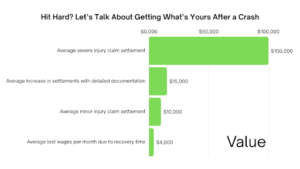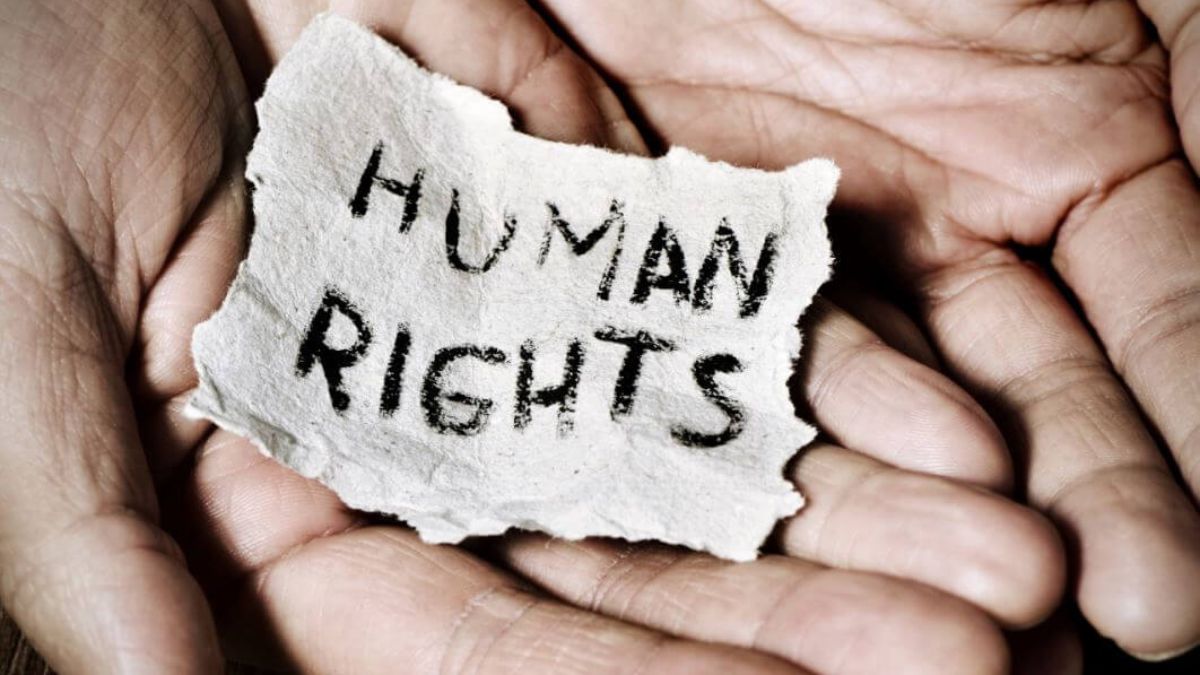LAW
Hit Hard? Let’s Talk About Getting What’s Yours After a Crash

An accident can turn your life upside down in seconds, leaving you with questions about damages, insurance, and compensation. It’s normal to feel devastated, as many people face similar struggles each year. The key to moving forward is knowing what steps to take. From documenting the scene to dealing with insurance companies and understanding your legal rights, preparation makes all the difference.
For instance, it is ascertained that 70% of persons who hold off for a great settlement offer end up getting payouts which average $30,700 more than those who take an insurance company offer after the accident. By doing everything the right way, you will protect yourself, recover just compensation, and regain power following an unexpected crash. Let’s take a step-by-step approach starting from the very beginning.
Start Where It Matters: Your Immediate Next Steps
Following an accident, the immediate aftermath is critical to your safety and case. Here’s what you need to prioritize:
Document Everything
Proper documentation will always make your claim strong. Capture pictures of the scene, damage, and injury from various angles, such as road signs and skid marks. Gather contacts of the witnesses and record significant aspects such as the weather, location, and time. Make a timeline of what happened and record all the communications with other parties involved, such as insurance.
Witness statements and detailed records may strengthen your case and help prevent disputes to prepare against any challenges thrown against your claim. If the accident results in a fatality, knowing how to pursue fatal accident compensation can also ensure the deceased’s family is supported financially. This careful record-keeping not only protects your rights but can significantly impact the outcome of your claim.
Seek Medical Attention
Following an accident, always prioritize your health. Even if you feel unhurt, some injuries, like internal trauma or whiplash, might not show symptoms right away. Delaying medical care can put your recovery at risk and weaken your case. Visiting a doctor promptly ensures you get the treatment you need and establishes a formal medical record. This documentation is essential to connect your injuries to the accident and to offer concrete evidence in support of your claim.
File a Police Report
It feels important to file a police report following an accident. The report, being an objective account of the incident, documents the time and date of the occurrence, location, and parties involved. This may help establish accountability and avoid conflicting stories that might raise questions about your claim. It is also usually asked by the insurance company before finally acting on a claim. You will have a good basis for any legal or insurance proceedings that may follow by reporting the accident promptly.
Having covered the immediate steps, let’s explore what you need to do when dealing with insurance companies.
Dealing With Insurance Companies: What You Need to Know
Insurance companies are enterprises whose objective is to protect money. Protect yourself with these steps:
Notify Your Insurance Provider
After the accident, contact your insurance company right away to report the incident. Stick to the facts, don’t speculate or admit fault, even if you feel responsible. Providing accurate information helps keep your claim on track and prevents complications later. The sooner you notify your provider, the quicker they can begin processing your claim. Remember, being clear and concise during this step sets the tone for a smoother claims process and helps protect your rights.
Understand Their Priorities
Insurance companies aim to minimize costs, which may lead to low settlement offers or delays. Insurance adjusters might push for quick resolutions, but it’s important to remain cautious. They could downplay your damages or injuries to limit their payout. Be wary of accepting offers that seem too quick or too low, as this might not cover your full recovery costs. Taking time to assess everything will ensure that you do not miss out on necessary compensation for long-term needs.
Don’t Rush to Settle
Getting all your medical bills covered after an accident should not be hastily achieved because it could nip future treatment, loss of income, or hidden damages because of injuries. It is easy to feel pressured to take the first offer given, but don’t do that in haste. Assess everything well about the effects of injuries and damages. Consult medical and legal professionals to be more apparent on what your long-term needs would be. This way, one can be sure that the settlement reflects the overall cost of the recovery.
While dealing with insurance companies is crucial, there are common pitfalls you need to be aware of to protect your claim.

Protecting Yourself From Common Pitfalls
Avoid these mistakes to keep your claim on track:
Avoid Discussing Fault at the Scene
It is also important not to admit fault at the scene. Even if you feel responsible, let the police and insurance companies investigate the situation. Any admission could be used against you later, complicating your claim. Stick to the facts and avoid making statements that might affect your case.
Seek Immediate Medical Attention
Even if you feel fine, it is important to get checked by a doctor right away. Some injuries, like whiplash, may not cause symptoms right away. Prompt medical treatment protects your health and establishes an official record of your claim.
Stay Off Social Media
Don’t write about the accident on social media. The post can become evidence to the insurer to dismiss the case or devalue the injuries. Anything you discuss could work against your claim, so remain silent during the claims process about your details.
Keep Thorough Records
Maintain a detailed record of any medical billing, receipts, and communication regarding the accident. These forms and communications are indispensable to proving the full extent of your injuries and damages and will help to strengthen your claim and assure that an appropriate award is obtained.
Now, let’s look at how to calculate the true value of your claim and ensure you’re fully compensated for all damages and losses.
Calculating the True Value of Your Claim
Your compensation should reflect the full impact of the accident, not just immediate expenses.
It’s More Than Just Medical Bills
- Include lost wages, emotional distress, and pain and suffering in your claim. It does not end at medical costs alone.
Use Documentation to Support Your Case
- Detailed records make it difficult for insurers to undervalue your claim.
- Keep track of repairs, prescriptions, and any costs related to the accident.
Understand What Impacts Settlements
Several factors may affect the amount of settlement; these include the severity of the injuries, policy limits, and liability. These elements help you estimate the real worth of your claim and avoid lowball offers.
Knowing your claim’s value is essential, but disputes can still arise. If negotiations stall or your rights feel uncertain, it might be time to seek legal help. Let’s explore your options.
When to Seek Legal Help: Knowing Your Options
Not every accident requires a lawyer, but knowing when to ask for help can make a big difference.
Handle Small Claims Independently
- Minor accidents with clear details may not need a lawyer. In such cases, handling your claim on your own might be enough.
Signs You Need Support
- Claims are denied or delayed.
- The other party disputes fault.
- You’re dealing with serious injuries or unclear liability.
How a Lawyer Helps
- A lawyer cares for negotiations, paperwork, and disputes. The lawyer ensures to protection of your rights and maximizes compensation so that one does not have to settle for lesser compensation.
Legal vs Independent Claim Management
| Aspect | Hiring a Lawyer | Handling It Alone |
| Complexity | Best for disputes or severe injuries | Suitable for straightforward cases |
| Cost | Contingency fee (paid from settlement) | No legal fees |
| Time Commitment | Less personal involvement | Requires full management by you |
| Outcome Potential | Often higher settlements | May settle for less |
FAQs
How do I know if my settlement offer is fair?
Compare the offer to medical bills, property loss, lost income, and anguish. Consult a lawyer if needed.
What if I was partially at fault for the accident?
Most states have comparative negligence laws. You will still be able to recover, but the amount will be reduced according to your percentage of fault.
How long does the claims process usually take?
Simple claims can be resolved in weeks, while complex cases may take months. Factors like evidence, disputes, and legal involvement affect timelines.
Putting You Back in Control
To walk out of this accident, details and patience matter. You safeguard your health by documenting everything while seeking medical attention and understanding how the claims process works. This will help you to take ample time to calculate the full damage and not feel hesitant to ask for legal support if needed. With the correct approach, you can get compensated and regain control over your recovery.
LAW
Ashcroft Capital Lawsuit: Cracks in the Empire or Strategic Diversion?

Prologue: Whispers of a Giant’s Fall
Ashcroft Capital isn’t just another name in the world of real estate investment — it’s a juggernaut that rose quickly, marketed aggressively, and attracted thousands of investors seeking passive income, freedom, and a slice of the American real estate dream. But behind the sheen of glossy brochures and YouTube videos promising financial independence through multifamily syndications, murmurs have turned into headlines. The Ashcroft Capital lawsuit has surfaced like a fissure in a polished marble facade, hinting at something deeper, darker, and more systemic.
Is this the fall of a revered empire? Or is it a sharp, tactical ploy amid a shifting legal and economic landscape? Let’s unpack the narrative.
Chapter 1: The Rise of Ashcroft Capital — Glamour, Growth, and Guts
Founded by former NFL player and CNBC commentator Joe Fairless, Ashcroft Capital made a name for itself by democratizing access to institutional-grade real estate. Their specialty? Multifamily properties — apartment complexes bought with investor capital, improved, and then either sold or refinanced at a profit. The pitch was irresistible: “You don’t need to be a landlord to make money in real estate.”
Fairless brought charisma, strategic vision, and storytelling prowess to the firm’s branding. Partnering with seasoned co-founder Frank Roessler, Ashcroft capitalized on post-2008 market dynamics, surging demand for rental properties, and the rise of financial influencers.
By 2022, the firm had reportedly acquired more than $2 billion in assets under management and claimed thousands of investors. Their seminars filled up. Their podcast was in the top real estate charts. Everything was too good.
And that’s exactly what caught the eyes of regulators, watchdogs, and eventually, the plaintiffs.
Chapter 2: Cracks in the Model — What Sparked the Ashcroft Capital Lawsuit?
It wasn’t just bad luck or a singular event. It was a cascade of stress fractures, many of which were latent from the start. The Ashcroft Capital lawsuit, as it stands, reportedly revolves around the following accusations:
-
Misrepresentation of returns: Plaintiffs allege that Ashcroft marketed investments with unrealistic return projections and failed to disclose the risks adequately.
-
Conflicts of interest: Several filings claim that Ashcroft’s internal structure allowed for self-dealing, especially in property management and renovation contracts.
-
Failure in fiduciary duties: As a syndicator and asset manager, Ashcroft had legal and ethical obligations toward its investors — some of which are now under scrutiny.
-
Poor due diligence in acquisitions: Lawsuits argue that certain properties were overvalued or poorly vetted, leading to losses that could have been avoided.
These lawsuits come at a time when the entire real estate syndication space is facing a reckoning. Rising interest rates, declining asset values, and tightening liquidity have exposed operational inefficiencies — and in some cases, possible malfeasance.
Chapter 3: Reading Between the Legal Lines
Let’s be clear: not all lawsuits imply guilt. In the U.S., legal action is often used as a strategic tool — to delay, to intimidate, or to force negotiation. That said, the Ashcroft Capital lawsuit is significant not just for what it alleges, but for the implications it casts across the entire passive investing community.
1. Investor Due Diligence Revisited
Many passive investors relied solely on Ashcroft’s polished pitch decks and confident webinars. The lawsuit challenges whether investors asked the right questions or simply bought into the story.
2. The Risk of Scaling Too Fast
One of the biggest questions this lawsuit raises is whether Ashcroft scaled responsibly. In a low-interest environment, it’s easy to look smart — but as rates rise and NOI (net operating income) shrinks, the cracks widen.
3. Regulatory Tightening Is Inevitable
This case may become a landmark moment that forces the SEC and other regulators to increase oversight of real estate syndicators and crowdfunding platforms.
Chapter 4: Anatomy of a Financial Allegory
Let’s zoom out. The Ashcroft Capital lawsuit is more than a legal skirmish — it’s a parable about the American obsession with passive income. We were told we could beat inflation, avoid Wall Street volatility, and retire early with real estate syndications. For many, Ashcroft Capital was that dream personified.
But real estate, like any investment, is cyclical, complex, and unforgiving. When markets rise, everyone looks like a genius. When they fall, the lawsuits fly.
Much like the WeWork implosion redefined startup valuations, this case could fundamentally change how LP (limited partner) capital flows into real estate deals.
Chapter 5: The Defense’s Stance — Is Ashcroft Playing the Long Game?
Ashcroft Capital has not remained silent. In fact, the company’s legal team has already begun constructing a defense narrative:
-
Transparent communication: Ashcroft claims it provided quarterly reports, property updates, and investor communications consistent with industry norms.
-
Market volatility: They argue that unexpected macroeconomic conditions — specifically post-COVID inflation and interest rate hikes — triggered asset-level issues beyond any syndicator’s control.
-
Operational pivot: The firm has reportedly adjusted its underwriting models, paused new acquisitions, and focused on stabilizing current properties.
In other words, they’re not saying the ride hasn’t gotten bumpy — they’re saying everyone is hitting potholes right now.
Chapter 6: The Human Fallout — Investor Stories
To understand the true depth of the Ashcroft Capital lawsuit, you have to talk to the investors.
Case 1: James in Tampa, FL
A first-time passive investor, James put $100,000 into a Houston multifamily deal. “I was told I’d get quarterly distributions and a double in five years,” he said. “The distributions stopped. The property value dropped. And I can’t even get a straight answer now.”
Case 2: Priya in San Jose, CA
An engineer-turned-angel investor, Priya had placed capital in five Ashcroft deals. “I was diversifying, but all five started showing distress at once. One of them was sold at a loss. I feel misled.”
Case 3: Anonymous insider
A former consultant who worked with Ashcroft anonymously shared, “There was pressure to always look positive. Occupancy reports were sometimes selectively framed. Renovation costs ballooned, and underwriting was overly optimistic.”
These aren’t isolated stories — and whether they hold legal water or not, they shape the court of public opinion.
Chapter 7: Broader Implications — Is This the Syndication Bubble Popping?
The lawsuit may mark the beginning of a broader contraction in the real estate syndication space. A few ripple effects already emerging:
-
LPs are tightening scrutiny: Investors are demanding better transparency, conservative underwriting, and more liquid structures.
-
GPs are facing capital flight: Many general partners, even those with clean records, are struggling to raise capital in 2025.
-
Legal insurance premiums are rising: Syndicators are now factoring litigation risks into their operating budgets.
-
Education is trending: Online communities are buzzing with lessons from the Ashcroft fallout — even prompting books, courses, and panels titled “Avoiding the Ashcroft Trap.”
Chapter 8: Lessons for the Industry and the Individual
The Ashcroft Capital lawsuit isn’t just about one company. It’s a mirror held up to an industry — and to the thousands of individuals who believed passive income could be truly passive.
If you’re an investor, here’s what to take away:
-
Don’t invest in charisma. Joe Fairless is compelling, but charisma isn’t a substitute for conservative underwriting or market-tested returns.
-
Ask the hard questions. Dig into debt structures, business plans, and exit strategies before signing.
-
Know your rights. Syndicated deals often rely on Regulation D exemptions — understand what legal protections you have (or don’t).
-
Diversify smartly. Across asset classes, geographies, and syndicators. One operator’s misstep shouldn’t wipe out your portfolio.
And if you’re a syndicator:
-
Reputation is fragile. In the world of high-trust capital, one lawsuit can scar a brand for years.
-
Legal compliance isn’t optional. Even gray areas — like marketing language — can trigger lawsuits.
-
Communicate constantly. Transparency, even when things go wrong, builds more goodwill than silence.
Epilogue: From Fallout to Framework
The Ashcroft Capital lawsuit is ongoing. Courts will deliberate. Deals may dissolve. Assets might be sold under pressure. But the deeper story — the why behind it all — is unfolding in real time.
In some future GQ-style business retrospective, this moment will be bookmarked as the point when the passive income dream turned into a legal nightmare for some — and a wake-up call for the rest.
Because in the end, whether you’re raising capital or writing checks, one truth remains: real estate isn’t just about buildings — it’s about trust. And once that crumbles, no amount of brick and mortar can rebuild it.
LAW
The Importance of Ombudsmänner in Protecting Citizens’ Rights

In a world where bureaucracy can sometimes feel overwhelming, the role of ombudsmänner emerges as a beacon of hope for citizens. These dedicated officials serve as advocates, ensuring that individuals have a voice when facing challenges with public services and institutions. Whether it’s addressing complaints about unfair treatment or safeguarding rights against injustices, ombudsmänner are essential players in the landscape of governance.
But what exactly do they do? And why does their work matter so much to everyday people? Join us as we explore the fascinating journey of ombudsmänner, their vital functions in protecting citizens‘ rights, and some remarkable stories that highlight their impact on society. Let’s dive into this crucial topic together!
What is an Ombudsman?
An ombudsman is an independent, impartial official who investigates complaints and disputes between individuals and public authorities. They act as intermediaries, ensuring that citizens have access to fair treatment within government systems.
Typically appointed by the government or a specific organization, ombudsmänner play a vital role in promoting transparency and accountability. Their work often involves looking into issues like maladministration, discrimination, or violations of rights.
These officials not only address individual grievances but also identify systemic problems within institutions. By doing so, they contribute to improving policies and procedures that affect many people.
Ombudsmänner serve as trusted advocates for ordinary citizens navigating complex bureaucracies. Their presence helps foster confidence in public services while empowering individuals to speak up against injustices they may face.
History and Development of Ombudsmen
The concept of an ombudsman dates back to Sweden in the early 19th century. The term “ombudsman” comes from the Swedish word meaning representative. Initially, these officials were designated to handle complaints against government actions.
As democratic principles spread across Europe, other countries saw the value in appointing similar figures. By the mid-20th century, nations like New Zealand and Finland adopted their own versions, emphasizing accountability and transparency in governance.
Over time, the role evolved beyond governmental oversight. Today’s ombudsmänner address issues within private organizations as well. They serve as vital links between citizens and institutions, ensuring that everyone has access to justice.
With advancements in technology and communication, modern ombudsmen have expanded their reach significantly. They utilize digital platforms for filing grievances, making it easier for individuals to seek help when needed.
The Role of Ombudsmen in Protecting Citizens’ Rights
Ombudsmen play a crucial role in ensuring that citizens’ rights are upheld. They act as intermediaries between the public and institutions, providing an essential platform for grievances.
When individuals face injustices or bureaucratic hurdles, ombudsmänner step in to investigate complaints. Their impartial stance allows them to address issues fairly and transparently.
Moreover, these advocates promote accountability within organizations. By addressing systemic problems, they ensure that policies are not only followed but also evaluated for fairness and effectiveness.
Through mediation and recommendations, ombudsmen foster dialogue. This often leads to resolutions that benefit both parties while reinforcing trust in public services.
Their presence empowers citizens by giving them a voice against potential abuses of power. Ombudsmänner stand as guardians of justice in society, helping maintain the balance between authority and individual rights.
Types of Ombudsmen
Ombudsmänner come in various forms, each tailored to address specific issues and sectors.
Government ombudsmen focus on public administration. They handle complaints regarding government agencies, ensuring transparency and accountability.
Corporate ombudsmen operate within businesses to resolve employee grievances or customer disputes. Their role fosters trust between the company and its stakeholders.
Educational ombudspersons serve students and faculty members alike. They tackle concerns related to academic institutions, promoting fairness in policies and procedures.
Healthcare ombudsmen advocate for patients’ rights, addressing complaints about medical services. They ensure that healthcare providers meet standards of care.
Specialized ombudspersons exist for unique sectors such as finance or environment. These professionals work diligently to protect citizens’ interests across diverse fields. Each type plays a crucial role in maintaining justice and equity within their respective spheres.
How to File a Complaint with an Ombudsman
Filing a complaint with an ombudsman can seem daunting, but it doesn’t have to be. Start by identifying the appropriate ombudsman for your issue. Different sectors have specialized representatives.
Once you’ve located the right office, gather all necessary documents related to your complaint. This might include emails, letters, or records of previous communications. Clear evidence strengthens your case.
Next, visit the ombudsman’s website for specific filing instructions. Many offices offer online forms that make submission easy and efficient. If you prefer speaking directly to someone, consider calling their office for guidance.
Be concise in explaining your situation and clearly state what resolution you’re seeking. Avoid emotional language; stick to facts as much as possible.
Once submitted, keep track of any correspondence from the ombudsman’s office regarding updates or requests for additional information.
Success Stories: Examples of Ombudsman Interventions
Ombudsmänner have made significant impacts in various cases, showcasing their essential role in advocating for citizens. One notable success story involved a group of tenants facing unjust eviction. The local ombudsman intervened, mediating between the landlords and tenants to ensure fair treatment. This led to a resolution that allowed families to remain in their homes.
Another example comes from the realm of healthcare. A patient filed a complaint against a hospital regarding inadequate care during surgery. The ombudsman conducted an investigation, uncovering systemic issues within the facility’s practices. As a result, new protocols were established, ultimately improving patient safety.
In education, an ombudsperson helped resolve disputes over special needs services for students. By facilitating communication between parents and school officials, they ensured children received appropriate resources tailored to their unique requirements.
These stories highlight how effective intervention can lead to meaningful change and reinforce trust between authorities and citizens.
Challenges and Criticisms Faced by Ombudsmen
Ombudsmen play a crucial role in advocating for citizens’ rights, yet they face several challenges. One major issue is the lack of power. Many ombudsmänner can investigate complaints but have limited authority to enforce their recommendations.
Another challenge stems from public awareness. Not everyone knows about the existence of these offices or how to reach them. This can lead to underutilization, undermining their potential impact.
Additionally, ombudsmen often deal with bureaucratic resistance. Government agencies or private organizations may be reluctant to cooperate fully during investigations, hindering progress.
Critics also argue that some ombudsmänner might not represent all demographics equally, leading to concerns about impartiality and fairness in handling cases.
With rising expectations from the public, there’s pressure on these entities to deliver timely resolutions while navigating complex legal frameworks. Balancing effectiveness with limited resources remains an ongoing struggle.
Conclusion
Ombudsmänner play a vital role in ensuring that citizens’ rights are protected and upheld. Their existence is rooted in a rich history, evolving from early forms of advocacy to modern institutions designed for accountability. They embody the principle that everyone deserves a voice, especially when they feel wronged.
The various types of ombudsmänner serve different sectors—from local governments to healthcare systems—making it easier for individuals to seek help relevant to their specific issues. Filing a complaint with an ombudsman can be straightforward, empowering citizens by providing them with clear steps and guidance throughout the process.
Success stories abound where ombudsmänner have made significant impacts on individual lives or even broader systemic changes. These interventions highlight the importance of having impartial advocates working within our communities.
However, like any institution, ombudsmänner face challenges and criticisms that can hinder their effectiveness. Resource limitations and societal perceptions can pose obstacles that impact how well they fulfill their mission.
Despite these hurdles, the fundamental purpose remains: protecting citizen rights against injustices encountered in various public domains. The ongoing evolution of this role reflects society’s commitment to ensuring fairness and transparency at all levels of governance.
As more people become aware of what an ombudsman can do for them, we may see increased engagement with these important figures who tirelessly work towards safeguarding our collective rights.
LAW
How Expert Witnesses Can Help You Win Your Truck Accident Case

Truck accidents are pretty common in Albuquerque. If you’ve been hurt in a truck accident, you already know how confusing and stressful everything can feel. You might be dealing with serious injuries, car damage, lost work, and a lot of insurance paperwork. That’s where the right support matters—and one powerful way to strengthen your case is by using expert witnesses. They can help you in truck accident cases in Albuquerque. If you’re working with a truck accident lawyer in Albuquerque, they can help bring in the right experts to make sure your side of the story is fully understood and backed by facts.
What Is an Expert Witness?
An expert witness is someone who has deep knowledge or experience in a certain area—like trucking rules, crash science, or medical care. They are not just regular witnesses who saw what happened. Instead, they give their professional opinion based on their field of work.
For example, a crash reconstruction expert can explain how the accident happened, who was speeding, or whether the truck driver was at fault. A medical expert can explain how badly you were hurt and what kind of treatment you’ll need in the future.
These expert opinions carry a lot of weight in court. Judges and juries often rely on them to understand the facts better and make fair decisions.
Types of Expert Witnesses in Truck Accident Cases
There are different types of expert witnesses that a truck accident lawyer might bring into your case:
- Accident Reconstruction Experts
These experts use science and math to explain how the crash happened. They look at skid marks, damage to the vehicles, road conditions, and more. Their goal is to show who caused the crash and why. - Medical Experts
These are doctors or healthcare professionals who can talk about your injuries. They help prove that the crash caused your pain and show how it affects your life. They also explain if you’ll need more treatment in the future. - Trucking Industry Experts
These people know the rules and standards that truck drivers and companies must follow. They can tell if the truck driver broke any rules—like driving too many hours without rest or not checking the truck before driving. - Financial Experts
They help show how the accident has affected your finances. This includes lost wages, medical bills, or even the cost of long-term care.
Why Expert Witnesses Matter
In a truck accident case, the other side will often try to blame you or downplay your injuries. Expert witnesses can help protect you from this by explaining things clearly and with proof. Their job is to turn confusing or complicated information into simple facts that a jury can understand.
For example, maybe the truck driver says they weren’t speeding. A reconstruction expert can show, based on data and damage, that they were. Or if the insurance company says your injuries are not that serious, a medical expert can prove how painful and life-changing they really are.
Having expert witnesses gives your case a strong foundation. It’s not just your word against theirs—it’s your word plus solid, professional backing.
Your Lawyer Will Handle the Experts
Don’t worry about finding or talking to expert witnesses yourself. A skilled truck accident lawyer knows exactly who to contact and when to bring them in. They’ll handle all the legal details so you can focus on healing.
The lawyer works with the experts to build a timeline of what happened, gather documents, and prepare everything for trial if needed. Often, having expert witnesses makes your case so strong that the other side may settle without going to court.
Conclusion
If you’ve been in a truck accident, don’t try to fight the case alone. With the help of a truck accident lawyer, expert witnesses can make a big difference in proving what really happened and getting you the money you deserve. They bring the facts, the science, and the proof that helps win your case.
You deserve support that’s strong, clear, and on your side—and expert witnesses are one of the best tools to get there.
-

 TECHNOLOGY1 week ago
TECHNOLOGY1 week agoTop 10 Must-Read Stories from Kristen Archives You Can’t Miss
-

 TECHNOLOGY6 months ago
TECHNOLOGY6 months agoSky Bri Net Worth Revealed: How She Built Her Financial Empire
-

 TOPIC8 months ago
TOPIC8 months agoBasement Renovation Contractors: How They Tackle Structural Issues During Renovations
-

 TOPIC3 months ago
TOPIC3 months ago5 Reasons the //Vital-Mag.Net Blog Dominates Lifestyle
-

 TOPIC1 month ago
TOPIC1 month agoTop 10 Articles from the ://Vital-Mag.net Blog That You Can’t Miss
-

 CRYPTO4 months ago
CRYPTO4 months agoCrypto30x.com Review: Is It the Right Platform for You?
-

 BUSINESS2 weeks ago
BUSINESS2 weeks agoTraceLoans Explained What You Need to Know
-

 BUSINESS3 weeks ago
BUSINESS3 weeks agoDecoding the Kennedy Funding Ripoff Report: Facts vs. Fiction
